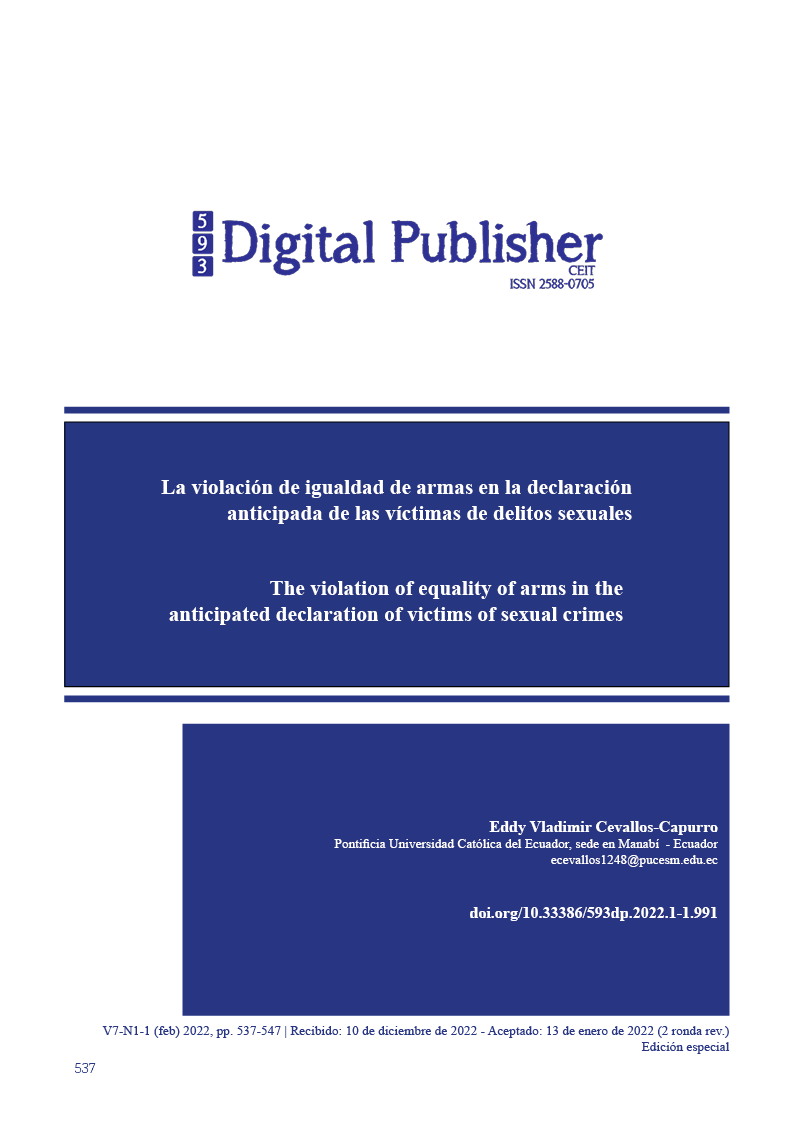The violation of equality of arms in the anticipated declaration of victims of sexual crimes.
Main Article Content
Abstract
Crimes against sexual integrity are dealt with based on the basic evidence given by the testimony, taking into account that said criminal act generally takes place without the presence of eyewitnesses. In this way, to prevent the victim from being re-victimized, in Ecuador use is made of advance testimony, which is fully consistent with all the principles of due process, in the same way it must be considered that, through the use of the camera of Gessel for the taking of early testimony of the victims of sexual crimes, the illegitimate restriction of the principle of equality of arms is avoided, being important to emphasize that within the resources contemplated by the right to defense there is space for the parties to support their positions and rebut the foundations by the counterpart, hence the guarantees of active participation and equality of arms stand out within the right to defense in such a way as to guarantee the contribution of elements that legitimize or discharge a criminal process.
Downloads
Article Details

This work is licensed under a Creative Commons Attribution-NonCommercial-ShareAlike 4.0 International License.
1. Derechos de autor
Las obras que se publican en 593 Digital Publisher CEIT están sujetas a los siguientes términos:
1.1. 593 Digital Publisher CEIT, conserva los derechos patrimoniales (copyright) de las obras publicadas, favorece y permite la reutilización de las mismas bajo la licencia Licencia Creative Commons 4.0 de Reconocimiento-NoComercial-CompartirIgual 4.0, por lo cual se pueden copiar, usar, difundir, transmitir y exponer públicamente, siempre que:
1.1.a. Se cite la autoría y fuente original de su publicación (revista, editorial, URL).
1.1.b. No se usen para fines comerciales u onerosos.
1.1.c. Se mencione la existencia y especificaciones de esta licencia de uso.
References
Agudelo, M. (2016). Debido Proceso. Opinión Jurídica, 89.
Alcorta, A. (2018). Las Garantías Constitucionales . Lexington : Ulan Press.
Alonso, J.-M., Font, P., & Val, A. (2017). “Ep! No badis! Guía pedagógica para la prevención del abuso sexual y otros malos tratos . Barcelona: Associació Catalana por la Infancia Maltractada. Diputació de Barcelona.
Asamblea Nacional . (2014). Código Orgánico Integral Penal. Quito: Registro Oficial.
Asamblea Nacional. (22 de octubre de 2008). Constitución de la República del Ecuador. Obtenido de https://www.oas.org/juridico/pdfs/mesicic4_ecu_const.pdf
Belaunde, D. (2016). Derecho procesal constitucional. Bogotá: Grupo Editorial Ibañez.
Berning, A. (2009). El Estado Constitucional de Derechos y Justicia. Revista Judicial No. 8758, 9-10.
Boldova, M. (2016). Pornografía infantil en la red. Fundamentos y límites de la intervención del Derecho Penal Ubijus. México D.F. : Editorial SA de CV .
Chaúan, S. (2012). Manual del nuevo procedimiento penal. Santiago de Chile: Lexis.
Corte Interamericana de Derechos Humanos. (1979). Convención Americana sobre Derechos Humanos. San José: Organización de los Estados Americanos.
Cubas, V. (2017). El Proceso Penal. Teoría Práctica. Lima: Palestra Editores.
Cuéllar, J. (2013). Proceso Penal. Bogotá: Universidad Externado de Colombia.
Cueva, L. (2014). El Debido Proceso. España: Ediciones Cueva Carrión.
D´Albora, F. (2018). Código al Procesal Penal de la Nación. Buenos Aires: Lexis.
Quezada, R. (2015). Fundamentación práctica del Derecho. Quito: Universidad Central del Ecuador.
Vladila, L., Ionescu, S., & Matei, D. (2011). El Derecho de Defensa. Obtenido de file:///C:/Users/HOME/Downloads/Dialnet-ElDerechoDeDefensa-3821722.pdf
Zavala, J. (2014). Derecho constitucional . Guayaquil: Murillo Editores.


